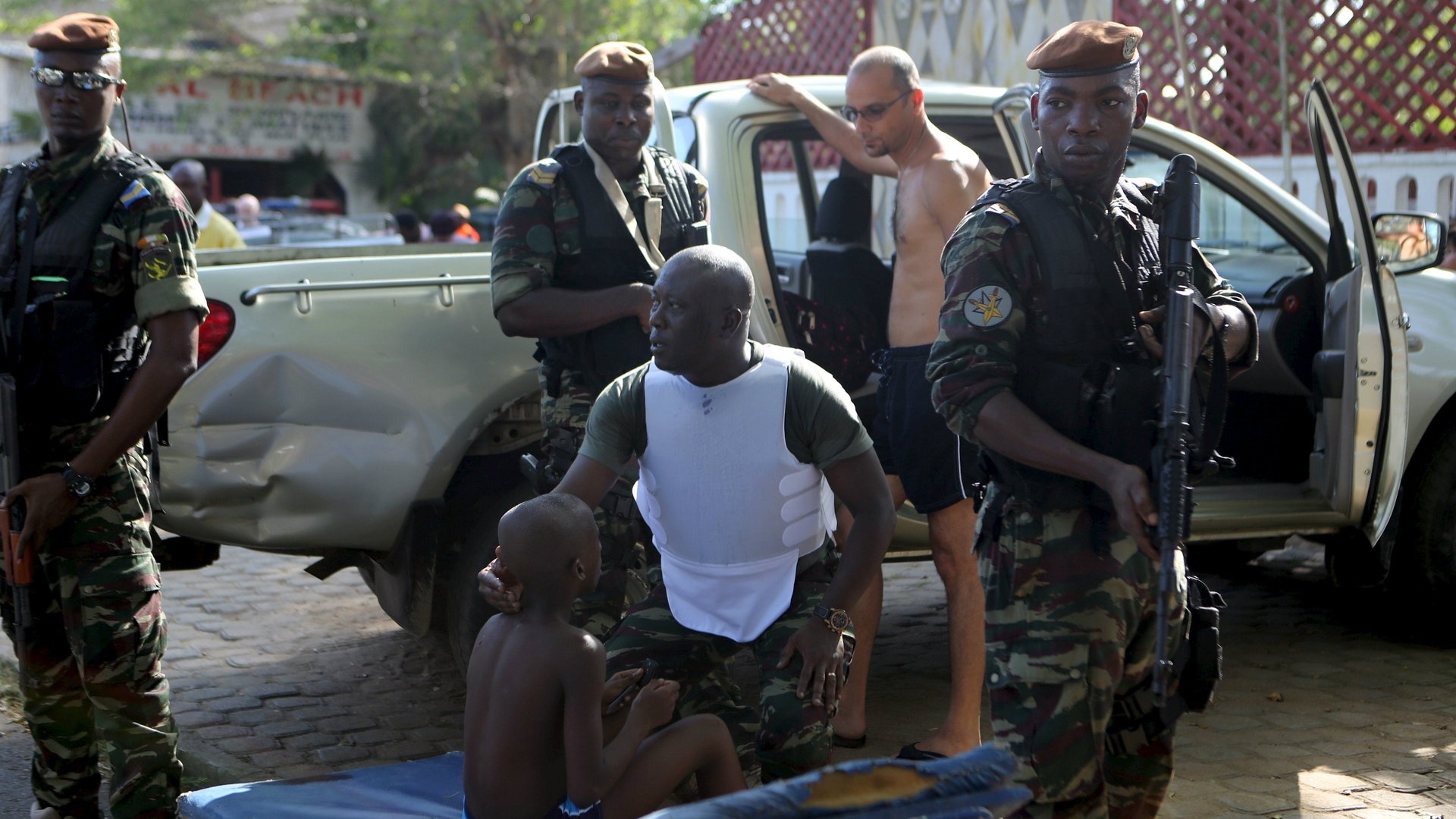A rivalry between al-Qaeda and ISIL is behind the rise of terrorism in West Africa
Over the last six months, there have been three attacks in West Africa perpetrated by a group that calls itself Al-Qaeda in the Islamic Maghreb (AQIM). These attacks, the group said in a statement yesterday (Mar. 15), were geared towards forcing the withdrawal of French forces in the region. France deployed troops in Mali in 2012 to fight off a militant uprising in the north of the country, and has established a 3000-strong military presence in the region to combat violent extremism.


Over the last six months, there have been three attacks in West Africa perpetrated by a group that calls itself Al-Qaeda in the Islamic Maghreb (AQIM). These attacks, the group said in a statement yesterday (Mar. 15), were geared towards forcing the withdrawal of French forces in the region. France deployed troops in Mali in 2012 to fight off a militant uprising in the north of the country, and has established a 3000-strong military presence in the region to combat violent extremism.
But the recent attacks by AQIM are actually a reaction to the rise of the extremist group the Islamic State, also known as ISIS or ISIL, which is challenging al-Qaeda’s position in the region, some analysts (paywall) and local correspondents believe.
“Both organizations want to claim north and, increasingly, western Africa as their own sphere of influence,” Jason Burke, who has written extensively on al-Qaeda, wrote earlier this week in The Guardian. “AQIM is currently the most tenacious and effective of al-Qaida’s affiliates. If it fades definitively from the scene, so would its parent organization.”
AQIM seems to be rearing up to prevent this. The shootings on Sunday (Mar. 13) in the resort town of Grand Bassam in Cote d’Ivoire that left 18 people dead were the group’s latest attack. In November, gunmen killed 21 people at a hotel popular with foreigners in Mali. And earlier this year a similar attack took place in Burkina Faso’s capital, Ouagadougou, where 28 people died at the hands of militants. In all three instances, AQIM claimed responsibility for carrying out the attacks.
The move by AQIM to ramp up attacks in West Africa, targeting countries that are historically not known as hotbeds of militant activity despite recent political instability, may be a way for the group to re-assert itself in the wake of ISIL’s rise in the region, security experts point out. “The guys in Mali saw a big opportunity to remind everyone that they are still relevant,” Richard Barrett, the former head of counter-terrorism operations at MI6, told The New York Times.
Libya is ground zero for this rivalry. Ever since the fall of Muammar Gaddafi in 2011, the fight for power between rival groups has led to chaos in the North African country. With no discernible national authority to guarantee security, militant groups, including ISIL, have infiltrated, using it as a hub to launch attacks and sell weapons in West Africa.
“Libya appears to be emerging as a safe haven where terrorists, including al-Qa’ida and Islamic State of Iraq and the Levant-affiliated groups, can train and rebuild with impunity,” general David M. Rodriguez, the head of the United States Africa Command (AFRICOM), told US senators last year.
A United Nations report released last December estimated the number of ISIL fighters in Libya to be 2,000 to 3,000. And despite resistance from the local population, the group sees Libya as “as the ‘best’ opportunity to expand its so-called caliphate” from Syria and Iraq, the UN’s experts said at the time.
In the region, ISIL has prompted the defections of AQIM fighters and splits between allies. Last May, for example, the Nigerian extremist group Boko Haram, which analysts believed had been affiliated with al-Qaeda, pledged allegiance to ISIL.
Alliances and recruitment are not the only thing that AQIM has to worry about with ISIL emerging in its backyard. The rift between the two groups, which goes back to 2014, means that they now have to compete for funding. North and West Africa is highly lucrative for al-Qaeda through its kidnapping of tourists for ransom, weapons selling and smuggling of stolen goods. ISIL’s emergence could challenge al-Qaeda’s operations in the region.
The attacks in West Africa could be a harbinger of what’s to come as the groups ramp up attacks to show that they are credible flag-bearers of jihadism.
“The world is now threatened by parallel, competing jihadist networks and a host of upstart terror groups on three continents attempting to outpace one another through spectacular attacks,” Clive Watts, a senior fellow with the national security program at the Foreign Policy Research Institute, warned last November.